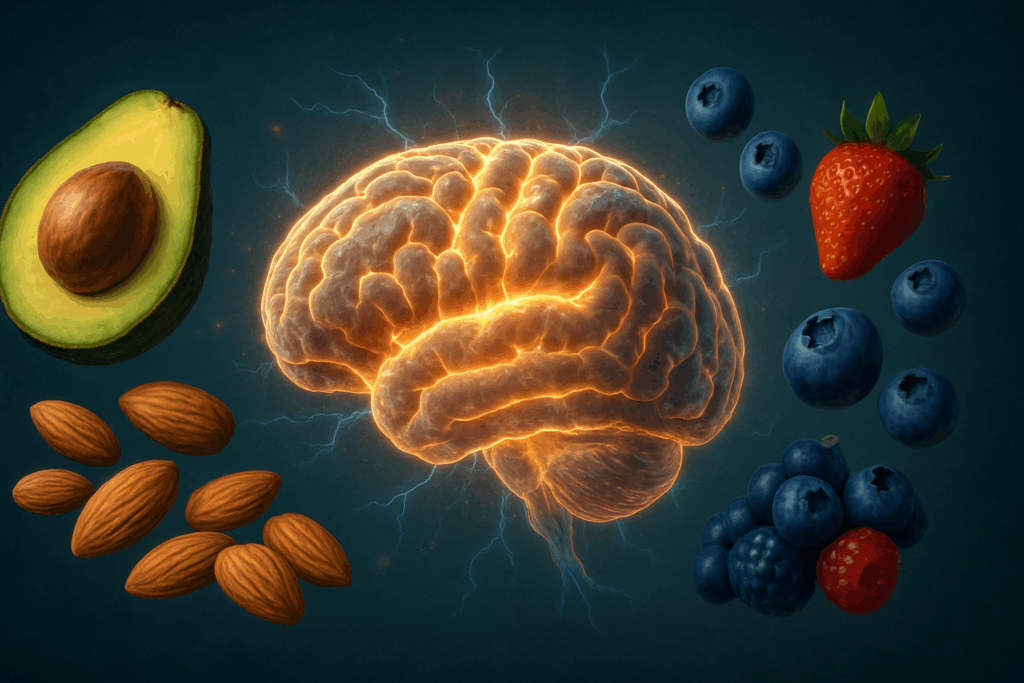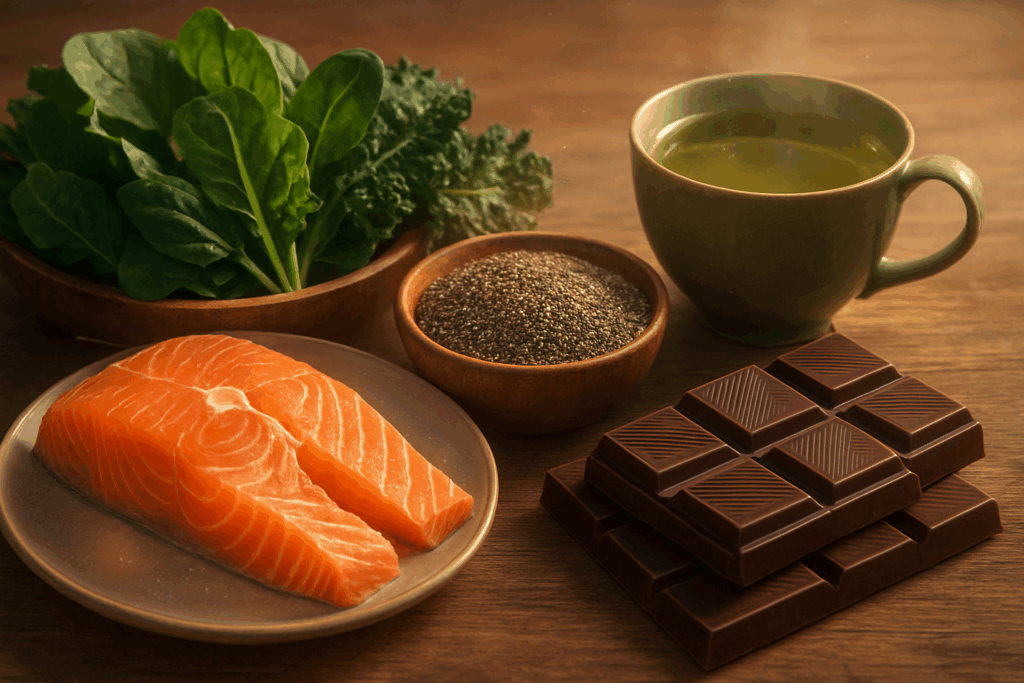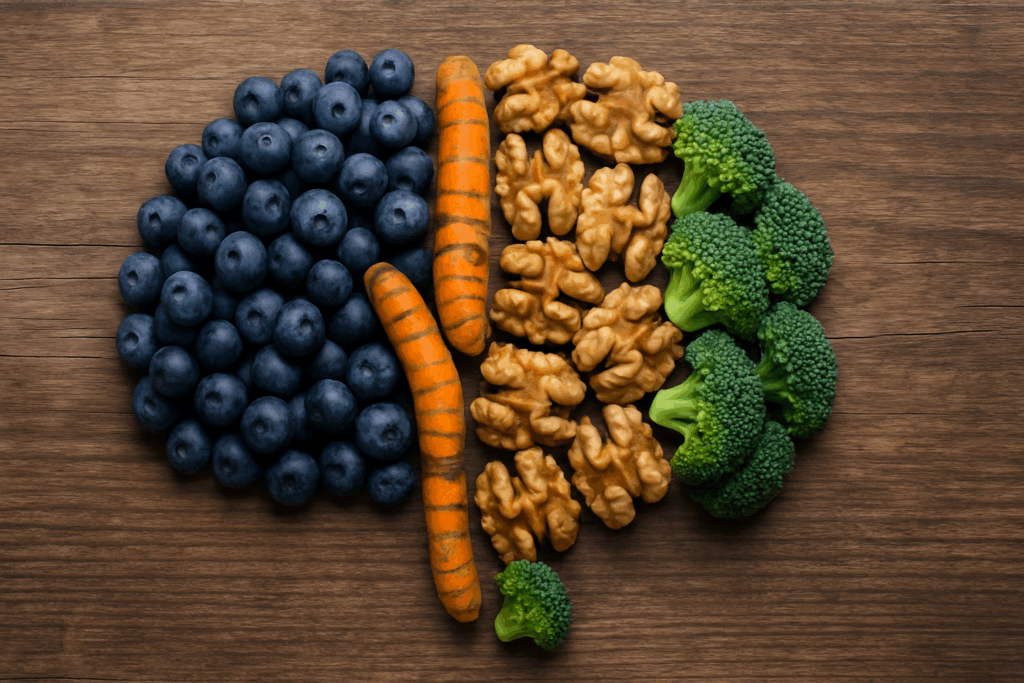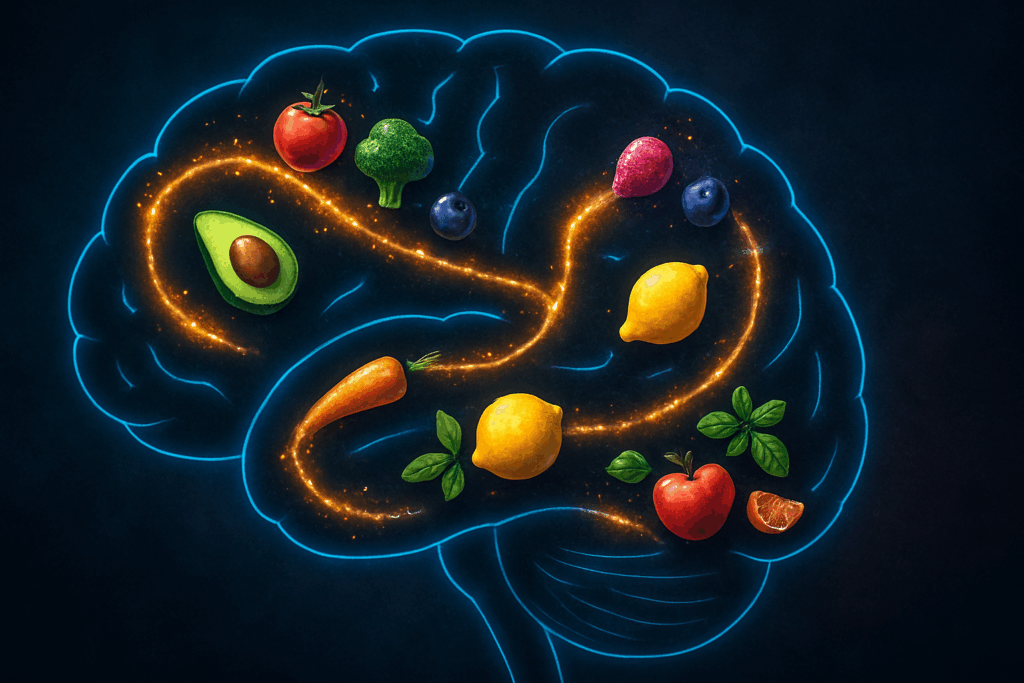The connection between nutrition and cognitive health has gained remarkable attention over the past few decades. While most people recognize that what they eat influences their physical health, fewer realize that diet plays a pivotal role in decision making methods and techniques. Nutrient-dense foods and herbs provide the brain with essential compounds that can sharpen memory, enhance focus, and strengthen the mental clarity necessary for good judgment. In an age where decision methods are being refined for both personal and professional applications, understanding how natural nutrition can fortify the mind is a crucial advantage.
You may also like: Navigating Life: Anxiety’s Impact on Decision-Making
Understanding the Role of Nutrition in Cognitive Function
To comprehend how natural foods and herbs affect decision making methods and techniques, it is essential to first understand how cognitive processes operate. The brain requires a steady supply of glucose, healthy fats, amino acids, and micronutrients to function optimally. Depletion of these nutrients can lead to diminished decision making ability, poor memory retention, and slower reaction times. Good decision making is related to being mentally agile, emotionally balanced, and physically healthy. Thus, the foundation for enhancing decision methods often begins with nutritional interventions that support brain health.

The importance of brain-boosting foods becomes even more apparent when examining complex decision-making scenarios. For example, executives navigating development decision making, students tackling what you read for exams, and healthcare workers managing split-second judgments all benefit from the improved cognitive resilience that nutrition offers. The right foods can influence neurotransmitter production, bolster neural plasticity, and reduce inflammation—all of which are critical factors for effective decision making at work examples.
Essential Nutrients for Strengthening Decision Methods
When diving deeper into the mechanics of decision methods, certain nutrients consistently emerge as key players. Omega-3 fatty acids, found abundantly in fatty fish like salmon and in chia seeds, are crucial for maintaining membrane fluidity in brain cells. This fluidity allows neurons to communicate efficiently, leading to better decision making ability. Similarly, B-complex vitamins, including B6, B9, and B12, are vital for the synthesis of neurotransmitters like dopamine and serotonin, which influence mood, motivation, and cognitive clarity.
Magnesium is another essential mineral that supports better decision methods by promoting relaxation and reducing stress-induced cognitive impairments. Foods such as leafy greens, nuts, and whole grains are excellent sources of magnesium. Additionally, antioxidants found in berries, dark chocolate, and green tea protect the brain from oxidative damage, preserving sharp decision-making faculties even under pressure. When individuals consume a nutrient-rich diet, they improve their ability to make decisions with confidence and precision.

Natural Herbs That Enhance Decision Making Ability
Beyond everyday foods, specific herbs have been celebrated for centuries for their cognitive-enhancing properties. Ginkgo biloba, for instance, is well-known for increasing blood flow to the brain, which can improve concentration and support various decision making methods and techniques. Similarly, Bacopa monnieri, an adaptogenic herb from Ayurvedic medicine, has demonstrated effectiveness in boosting memory and reducing anxiety, two factors critical for effective decision methods.
Rhodiola rosea is another herb that supports decision making at work examples by enhancing resilience to physical and emotional stress. Adaptogens like Rhodiola work by modulating the body’s stress response, ensuring that decision makers remain calm and clear-headed even in high-stakes situations. Lion’s Mane mushroom, rich in compounds that stimulate nerve growth factor (NGF) production, supports long-term cognitive health, aiding in development decision making throughout a person’s life.
Linking Decision Making Processes to Brain Nutrition
A thorough exploration of decision making methods and techniques necessitates an understanding of the structured steps involved in sound decision making. Scholars often refer to models such as the 7 step decision making process or the five decision making steps to outline how individuals approach complex choices. Regardless of the model, it becomes clear that each step—from recognizing a problem to evaluating alternatives and implementing solutions—requires mental energy, clarity, and resilience.
When asking questions like how many steps are in the decision making process or which step comes first in the decision making process, it’s important to note that clarity and focus are paramount. The initial step, often described as identifying the decision to be made, relies heavily on perception and judgment—both of which are directly influenced by the brain’s nutritional state. The subsequent stages, whether defined by the 5 steps of decision making or the seven steps of decision making, depend on information processing speed, working memory, and emotional regulation, all of which benefit from optimal brain nutrition.

Natural Foods That Boost Memory and Learning
Another key aspect of effective decision methods involves memory retention and learning, especially when navigating the stages of the 8 steps in the decision making process. Foods like blueberries, turmeric, and walnuts have been linked to improved memory and learning capabilities. Blueberries, rich in anthocyanins, promote brain plasticity, aiding individuals in how to remember stuff when studying and applying that knowledge to real-world decisions.
Turmeric contains curcumin, a compound with potent anti-inflammatory and antioxidant properties. Regular consumption of turmeric may enhance memory and alleviate symptoms associated with cognitive decline. Walnuts, packed with DHA (a type of Omega-3 fatty acid), improve cognitive performance and support structural integrity in brain cells. These natural foods are indispensable allies for anyone seeking to strengthen their decision making methods and techniques.
Herbs That Improve Study and Memory Retention Skills
In addition to enhancing decision making at work examples, certain herbs specifically aid in study-related memory improvement. Rosemary, for example, has been shown to enhance memory and concentration through its aromatic compounds. This makes it a valuable tool when considering how to memorize something for a test or how to remember things while studying.
Another potent herb is Gotu Kola, often referred to as “brain food” in traditional Ayurvedic and Chinese medicine. Gotu Kola has been shown to improve cognitive function, reduce anxiety, and support better memory retention—key factors for making decisions based on accumulated knowledge. By incorporating these herbs into daily routines, students and professionals alike can better navigate the five stages of decision making process and other critical frameworks.
How Nutrition Supports Each Stage of the Decision Making Process
Nutrition’s influence extends beyond general cognitive support and into the specific phases of decision making. During the initial phase—problem identification—individuals must remain vigilant and perceptive, traits sharpened by a diet rich in leafy greens and fatty fish. The second stage—research and information gathering—requires stamina and focus, areas enhanced by complex carbohydrates from oats and sweet potatoes.
When individuals reach the stage of evaluating alternatives, antioxidant-rich foods such as dark berries and leafy greens can sharpen critical thinking and risk assessment capabilities. As decision makers move through the list the steps of decision making process, foods that stabilize mood, like fermented foods rich in probiotics, can prevent emotional biases from clouding judgment. Thus, at each point in the seven steps of decision making or the eight steps in the decision making process, specific nutritional interventions can offer targeted support.

Developing Better Decision Making Ability with Natural Foods and Herbs
Developing decision making ability is not solely about mastering theoretical models like the seven steps of decision making; it’s about cultivating a brain environment conducive to thoughtful analysis, memory recall, and emotional balance. Foods like avocados, which provide healthy monounsaturated fats, improve blood flow to the brain, enhancing processing speed. Dark chocolate, with its flavonoids and stimulatory properties, boosts alertness and mood.
The inclusion of adaptogenic herbs like Ashwagandha and Eleuthero can further support emotional regulation, ensuring that stress does not derail rational thinking. Building a nutrition plan that strategically incorporates these foods and herbs can lead to lasting improvements in how individuals approach development decision making, from simple daily choices to major life decisions.
The Interplay Between Diet, Memory, and Decision Making at Work
Professional environments often demand rapid yet precise decision making at work examples. Employees juggling multiple responsibilities need to retain vast amounts of information, recall it accurately, and apply it in high-pressure scenarios. Thus, knowing what you read for exams is only the beginning; sustaining that knowledge and applying it effectively is equally crucial.
Foods that support working memory, such as pumpkin seeds (rich in zinc) and broccoli (high in vitamin K), play a significant role in professional settings. Decision methods honed by training can be undermined if brain health is neglected. Therefore, businesses that promote nutritional wellness programs are investing not just in employee health, but in the quality of their organizational decision making as a whole.
Practical Tips for Using Natural Foods and Herbs to Support Decision Making
Incorporating natural foods and herbs into one’s diet to support decision making methods and techniques does not require radical lifestyle changes. Simple practices such as adding blueberries to morning oatmeal, seasoning meals with turmeric, or sipping on green tea can yield cognitive benefits over time. Supplementing with high-quality herbal extracts under professional guidance can also enhance mental clarity without relying on synthetic stimulants.
For students focused on how to memorize something for a test or professionals aiming to refine their decision methods, incorporating brain foods like fatty fish and avocados into their regular diet can be transformative. Planning meals to include a diverse array of brain-supportive nutrients ensures that the mind remains agile and prepared for the challenges ahead.

Frequently Asked Questions (FAQ): How Natural Foods and Herbs Can Support Better Decision Making Methods and Techniques
What are some lesser-known natural foods that support decision making methods and techniques?
In addition to common brain foods like blueberries and salmon, lesser-known options such as seaweed, pumpkin seeds, and blackcurrants offer substantial benefits for decision making methods and techniques. Seaweed provides iodine, essential for optimal thyroid function, which indirectly influences cognitive performance. Pumpkin seeds are rich in zinc, vital for neurotransmitter communication and emotional regulation during complex decision methods. Blackcurrants contain high levels of vitamin C, supporting neuronal health under stress, making them excellent allies when executing advanced decision making strategies. Incorporating these foods broadens nutritional support for a sharper and more resilient mind.
How do fermented foods influence decision methods and emotional clarity?
Emerging research highlights how fermented foods such as kefir, sauerkraut, and kimchi can significantly influence decision methods by improving gut health. A healthy gut microbiome enhances the gut-brain axis, leading to better emotional regulation and cognitive flexibility. When emotional reactions are tempered, individuals can follow structured decision making methods and techniques more effectively. This link between gut health and cognitive performance suggests that prioritizing fermented foods can refine both the emotional and analytical stages of decision methods. Future decision making models may increasingly integrate dietary strategies to strengthen emotional intelligence.
Can short-term diet changes improve decision methods quickly?
While long-term dietary habits yield the most profound cognitive benefits, certain short-term interventions can enhance decision methods in as little as a few days. Consuming high-antioxidant foods like dark chocolate or drinking green tea rich in L-theanine can temporarily boost alertness and focus. These acute improvements make it easier to apply decision making methods and techniques during critical situations. However, sustained improvement in decision methods still relies on a consistent, nutrient-dense diet over time. Quick fixes are best seen as supplementary rather than primary strategies for long-term decision support.
How does hydration impact decision making methods and techniques?
Hydration status profoundly influences brain function, yet it is often overlooked in discussions about decision methods. Even mild dehydration can impair working memory, attention, and mood stability, all of which are critical for executing decision making methods and techniques efficiently. Water supports blood flow and the delivery of essential nutrients to the brain, reinforcing clarity and quick thinking. Ensuring consistent hydration, along with nutrient-rich foods, strengthens both the speed and quality of decision methods. For best results, prioritize water intake alongside brain-supportive nutrition.
Are there specific herbs that aid in long-term strategic decision methods?
Long-term strategic decision methods demand sustained focus, foresight, and adaptability—qualities supported by herbs like Panax ginseng and Schisandra chinensis. Panax ginseng enhances mental stamina and reduces cognitive fatigue, allowing decision makers to remain sharp over extended periods. Schisandra chinensis improves resistance to stress and supports multi-tasking, key in complex decision making methods and techniques. Regular use of these herbs, combined with a balanced diet, prepares individuals for high-level, strategic decision making challenges over the long haul. Their role in enhancing cognitive resilience is gaining recognition in performance-focused nutrition.
Can mindfulness practices enhance the impact of nutrition on decision methods?
Mindfulness practices can amplify the benefits of nutrition on decision methods by promoting better internal awareness and emotional regulation. A brain well-nourished with foods supporting decision making methods and techniques becomes even more effective when paired with mindfulness meditation. Mindfulness reduces cognitive overload and impulsivity, making it easier to follow logical decision methods instead of defaulting to emotional reactions. Together, mindful eating and mindful thinking create a synergistic effect that improves both the process and the outcomes of decisions. Future integrative health approaches are likely to emphasize this combination.
How do decision making methods and techniques vary between high-stress and low-stress environments?
Decision making methods and techniques can shift significantly depending on the level of stress in an environment. Under high stress, individuals often revert to intuitive or heuristic decision methods, relying on gut feelings rather than deliberate analysis. Nutritional support through adaptogens like Rhodiola rosea or foods rich in magnesium can bolster cognitive flexibility under stress. In low-stress environments, individuals are better able to employ rational, multi-step decision methods, carefully weighing options. Thus, nutrition tailored to stress levels can help sustain optimal decision methods across diverse circumstances.
What role does sleep quality play in supporting decision methods?
Sleep quality is fundamental to maintaining effective decision methods because it directly affects memory consolidation, emotional regulation, and cognitive clarity. Natural foods that promote sleep, such as tart cherries (rich in melatonin) or almonds (high in magnesium), can indirectly enhance decision making methods and techniques by improving sleep hygiene. A well-rested brain is better at recognizing patterns, anticipating consequences, and resisting cognitive biases—essential for advanced decision methods. Poor sleep, conversely, often results in rushed and impaired decision-making processes, regardless of prior nutritional strategies. Thus, sleep and nutrition should be jointly optimized.
How might decision methods evolve with advances in nutritional neuroscience?
As nutritional neuroscience progresses, decision methods are likely to become increasingly personalized. Advances in genetic testing and microbiome profiling will allow tailored nutrition plans that optimize individual cognitive performance and specific decision making methods and techniques. We may soon see decision support systems integrating real-time nutritional data to adjust cognitive strategies dynamically. For example, wearable devices might suggest specific foods to improve decision-making under particular circumstances. This intersection of personalized nutrition and cognitive science promises to revolutionize how decision methods are applied in both personal and professional settings.
Can natural foods and herbs replace the need for formal decision-making training?
While natural foods and herbs offer substantial cognitive benefits, they are best viewed as complementary rather than replacements for formal decision-making training. Nutrition can enhance focus, memory, and emotional regulation, providing a strong foundation for practicing structured decision making methods and techniques. However, without conscious learning and application of proven decision methods, nutritional interventions alone cannot guarantee improved decision outcomes. Just as physical training and proper nutrition are both necessary for athletic performance, cognitive training and nutritional support must work together for optimal decision-making ability. Balancing both elements ensures the most robust cognitive performance over time.

Conclusion: Building Stronger Decision Methods Through Nutrition and Natural Remedies
The science is increasingly clear: natural foods and herbs play a vital role in supporting decision making methods and techniques. From the earliest stages of recognizing a problem to the final steps of evaluating and implementing solutions, brain health influences every facet of decision processes. Whether navigating the 5 steps of decision making, the seven steps in the decision making process, or even the eight steps in the decision making process, nutrition provides an often-overlooked foundation for success.
By understanding how many steps are there in the decision making process and appreciating what is the second step in the decision making process, individuals can tailor their diets to meet the specific cognitive demands of each stage. Incorporating nutrient-rich foods and scientifically supported herbs not only enhances decision making ability but fosters resilience, adaptability, and emotional stability. In an increasingly complex world where making sound decisions defines personal and professional success, nourishing the mind through natural means is both a timeless strategy and a cutting-edge advantage.
Further Reading:
The Decision-Making Process: How To Make Effective Decisions


